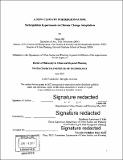A new climate for regionalism : metropolitan experiments in climate change adaptation
Author(s)
Shi, Linda, Ph. D. Massachusetts Institute of Technology
DownloadFull printable version (25.37Mb)
Alternative title
Metropolitan experiments in climate change adaptation
Other Contributors
Massachusetts Institute of Technology. Department of Urban Studies and Planning.
Advisor
Lawrence J. Vale.
Terms of use
Metadata
Show full item recordAbstract
Climate change threatens the function and even existence of coastal cities, requiring them to adapt by preparing for near-term risks and reorienting long-term development. Most policy and academic interest in the governance of climate adaptation has focused on global, national, and local scales. Their efforts increasingly revealed the need to plan for adaptation at the scale of metropolitan regions. This dissertation is the first academic comparative analysis of U.S. regional adaptation initiatives. Drawing on multi-method qualitative research of five coastal regions, I ask: are collaboratives to coordinate adaptation at the regional scale a new form of regionalism? What roles do state policies on climate change and regional governance play? I argue that adaptation collaboratives are an ecological variant of new regionalism that recenters the role of public agencies in advancing adaptation efforts. Adaptation champions have helped overcome limited local adaptation, even where states are antagonistic to climate action, by sharing knowledge, providing technical assistance, and fostering political support. However, most have yet to tackle the limitations of local adaptation. Instead, they have deployed narratives of climate change as predictable and manageable, and of regional adaptation as localized and ecological in ways that mask the need for more transformative developmental and governance paradigms. Only places with regional agencies or county governments that have land use authority, fiscal leverage, or state mandated targets have advanced region-wide zoning and long-term developmental changes. This indicates that state policies towards regional planning institutions are more influential in shaping regional adaptation than those focused on adaptation. Scholarship has shifted away from debates around forms of regional government, but these findings highlight the need to strengthen regional government in order to overcome difficulties in coordinating, implementing, and enforcing multi-sector and multi-jurisdictional responses to climate change. I conclude by calling for a renewed ecological regionalism that articulates a vision of regions functioning as an ecological whole, rather than as the sum of individual parts. I offer recommendations for how collaboratives and other advocates could build awareness and open dialogue about regional interdependence, conflicts, responsibility, and accountability. These processes become pathways to envisioning local preferences for regional governance, build buy-in and coalitions, and advocate for state enabling legislation.
Description
Thesis: Ph. D., Massachusetts Institute of Technology, Department of Urban Studies and Planning, 2017. Cataloged from PDF version of thesis. Includes bibliographical references (pages 161-175).
Date issued
2017Department
Massachusetts Institute of Technology. Department of Urban Studies and PlanningPublisher
Massachusetts Institute of Technology
Keywords
Urban Studies and Planning.